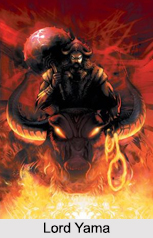 Lord Yama is the Hindu God of death, king of precursors and ultimate judge on the destination of souls. Lord Yama in Indian mythology is referred to as the Lord of Death. Vedas describe him as the first man who died. He is sometimes referred to as Dharma, in reference to his unswerving dedication to maintaining order and adherence to harmony. He is also believed to be the wisest of Devas. In the Katha Upanishad, Lord Yama is portrayed as a teacher.
Lord Yama is the Hindu God of death, king of precursors and ultimate judge on the destination of souls. Lord Yama in Indian mythology is referred to as the Lord of Death. Vedas describe him as the first man who died. He is sometimes referred to as Dharma, in reference to his unswerving dedication to maintaining order and adherence to harmony. He is also believed to be the wisest of Devas. In the Katha Upanishad, Lord Yama is portrayed as a teacher.
Myths of Lord Yama
Lord Yama is credited to be one of the most ancient beings of the world. According to myths, Lord Yama is the son of the Sun God and his mother is Saranyu-Samjna. He is the brother of Manu and he also has a twin sister, Yami (or Yamuna). In some myths, Yama and Yami are the first humans and creators of the human race but in other versions Lord Yama is the first human to die. Lord Yama is considered the father of Yudhisthira and his wives are Hemamala, Vijaya, and Susila.
He is considered to have incarnated as Vidur by some accounts in the Mahabharata period. Lord Yama is subordinate to the ultimate controllers Lord Shiva and Lord Vishnu. A story of Lord Yama`s sub ordinance to Shiva is well illustrated in the story of Markandeya. Yama is called "Kala", while Shiva is called "Mahakala". Another incidence, which shows Yama`s obedience to Vishnu, is as follows: A man Ajamila had committed many evil acts during his life such as stealing, abandoning his wife and children, and marrying a prostitute. At the moment of his death he involuntarily chanted the name of Narayana and achieved Moksha, saved from the messengers of Yama. Although Ajamila had actually been thinking the name of his youngest son, Narayana`s name had powerful effects, and thus Ajamila was released from his great sins.
As per Hindu myths, Lord Yama is assisted by Chitragupta who keeps complete records of actions of human beings on the earth. Lord Yama belongs to an early division of Vedic legends. His name means "twin", and in some legends he is paired with his twin sister Yami. He is represented as the guardian of the southern direction. The Vedic Yama was the basis for the Buddhist Yama which in turn became an essential part of Chinese and Japanese folklore. As per Hindu mythology a dead person based on his deeds is send to heaven or hell. This is decided by Lord Yama.
Lord Yama emerges in Puranas attempting to kick his mother Samjna and succeeded only in receiving a curse from his impending victim. He was condemned to have a dreadfully wounded leg which never healed. Luckily for Lord Yama, his father gave him a cock which ate all the vermin from his leg and finally he recovered, even if his permanently damaged leg thereafter gained him the name of "Sirnapada" or "shrivelled foot".
Iconography of Lord Yama
Lord Yama is often portrayed with green or blue skin and wearing red robes. His vehicle is a buffalo and he often carries a mace or rod which was made from a part of Sun. In Tibet, Yama is known as "Gsin-rje", the God is often represented with a demonic face and viciously stamping on somebody. He holds a noose of rope in one hand. A different iconographic form described in the "Viudharmottara" represents him with four arms and wearing golden yellow garments.
Lord Yama As A Judge of Souls
When souls arrive in Lord Yama"s "Kalici" palace, they are first met by Lord Yama"s porter Vaidhyata and then two attendants Kalapurusa and Chanda guide them to an audience with the great God. First, their worldly deeds are read out by Chitragupta, who maintains a huge register, the "Agrasandhani". Based on the evidence Lord Yama sits on his throne of judgement (Vicarabhu) and considers the three options he has at his discarding. The first and best is to be given immortality by drinking "soma" and sent to live eternally with the wise and virtuous Manes. Here the good souls enjoy the everlasting happiness and shine as stars in the celestial heavens. The second option is to be sent back into the world and be reborn in order to have a good life, although not necessarily as a human. The third and worst option is to be sent down into the 21 levels of hell.




















